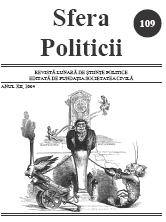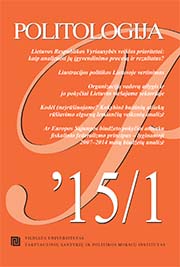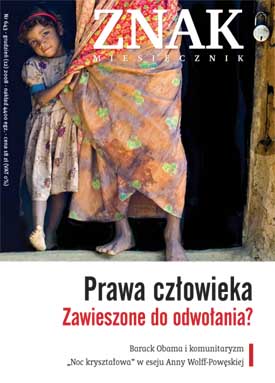


The present local elections campaign is a good opportunity to evaluate our political reality. The obvious professional campaign is not supported by a real political force of the parties or a maturity of the entire political system. The policies are replaced by the image, and the democratic vote is reduced to a validation mechanism. The parties have no policies, no vectors to make them popular and they appeal to various leaders and their image in order to persuade the electors. The specific policies and the local leaders are almost absent, making the confusion even greater an stressing the unnatural state of the Romanian democracy.
More...Adam Michnik la Chişinău „Mărturisirile unui disident convertit” © Vitalie Sprânceană „Raportul Tismăneanu” şi criticii săi – o cronică de Alexandru-Florin Platon Versuri de Aurelia Borzin şi Andreas Saurer Proză de Vladimir Beşleagă şi Vitalie Ciobanu Carmen Firan: „Frica de viitor” Scriitori polonezi la „Contrafort”: Czeslaw Milosz, Ryszard Kapuściński şi Маciej Sieńcyzk Mariana Codruţ despre cel mai recent film al lui Radu Jude Literatură germană contemporană: Ariane Grundies şi Daniel Kehlmann
More...
Norkus Zenonas, Du nepriklausomybės dvidešimtmečiai. Kapitalizmas, klasės ir demokratija Pirmojoje ir Antrojoje Lietuvos Respublikoje lyginamosios istorinės sociologijos požiūriu, Vilnius: Aukso žuvys, 2014. 703 p. ISBN 978-609-8120-04-2.
More...
A considerable empirical literature has arisen to explain what determines people’s decision to participate in such a pro-environmental behavior as recycling. Summarizing it, explanatory factors could be grouped into three main drivers: an effective and userfriendly infrastructure, information available to the residents, and their values and motivation. Examining the studies carried out in the context of Lithuania, it could be seen that the first two factors are given much attention, while the deep and extensive research of the third one is missing, regardless of how problematic the recycling issue in the country is. For this reason, the aim of the article is to identify the valuable and motivational drivers that influence the Lithuanian population sorting behavior and could help in formulating recommendations for effective interventions to promote or change it. Residents of the Alytus city municipality – population of the most advanced region in the field of waste management – are chosen as the sample of research. The Theory of Planned Behavior provides the tools and analysis model for the research. The qualitative methodological approach and a semi-structured interview as a method are used. The survey was conducted in March and April 2014, using a convenience sampling of 32 people. Content analysis using the Nvivo.10 QSR software package was applied for the data research. On the basis of findings, four prevailing behavioral models were distinguished: (1) “I do sort!” – active and conscious, (2) “I do as needed” – passive but acting, (3) “I will not do!” – frustrated and opposing, (3) “I do not care...” – unthinking and dormant. All of them are determined by the different conjuncture of the factors identified, therefore, organizing interventions to promote household waste sorting, the measures taken should be selected based on the characteristics of each type of behavior.
More...
Kissinger Henry, World Order, Penguin Press, 2014, 420 p
More...
Keywords: prawa człowieka; human rights; Rzecznik Praw Obywatelskich; Helsińska Fundacja Praw Człowieka; The Helsinki Foundation of Human Rights
More...
Keywords: theatre; Polish theatre; teatr polski; Dariusz Kosiński; Polski teatr przemiany; Jerzy Grotowski; teatr Grotowskiego
More...
Keywords: human rights; prawa człowieka; Universal Declaration of Human Rights; Powszechna Deklaracja Praw Człowieka; humanitarian law;
More...
Keywords: Wyspa; Island; Paweł Łungin; film rosyjski
More...

Keywords: human rihgts; prawa człowieka; The Helsinki Foundation for Human Rights; Helsińska Fundacja Praw Człowieka; kara śmierci; death penalty; Bortnowska
More...
Keywords: Halina Bortnowska; społeczeństwo; kara śmierci; death penalty; Polish society
More...
Keywords: Germany; Niemcy; noc kryształowa; III Rzesza; hitleryzm; pogrom
More...
Keywords: John Henry Newman; anglikanizm; katolicyzm
More...
Keywords: Jacek Podsiadło; Polska; społeczeństwo; PRL; Polish society; Polish Peoples' Republic; everyday life in Poland; życie codzienne w Polsce
More...
Keywords: Ryszard Legutko; Esej o duszy polskiej; polska filozofia; filozofia współczesna; Polish philosophy
More...
Keywords: barack obama; american policy; american elections; polityka amerykańska; prezydenci amerykańscy; wybory w USA
More...
Keywords: Bruksela; Brussels; Unia Europejska; European Unionl; Rada Europy; Counsil of Europe; polish politics
More...
Keywords: human rights; prawa człowieka; politics; ONZ; UN; United States; Stany Zjednoczone; Kosowo; Kosovo; Africa; Afryka; Irak; Afganistan; Afghanistan; Iraq; foreign policy; polityka zagraniczna
More...